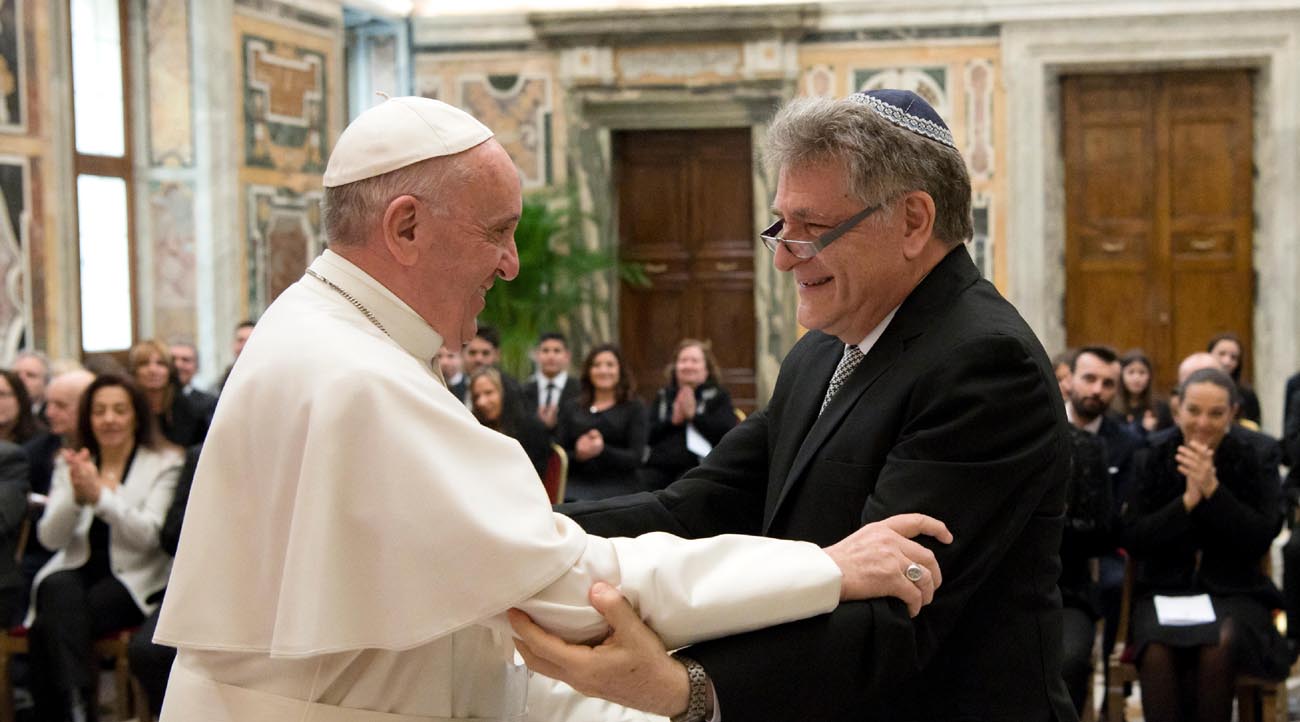
Pope Francis greets Rabbi Abraham Skorka during a meeting with an interreligious group of scholars at the Vatican Feb. 23, 2017. In a Sept. 18 reflection published by the Vatican, Rabbi Skorka called for a deeper awareness of humanity’s interconnectedness, as Jews throughout the world celebrate Rosh Hashanah amid the ongoing COVID pandemic. (CNS photo/L’Osservatore Romano)
As the Jewish community celebrates Rosh Hashanah, a rabbi and close friend of Pope Francis has called for a renewed understanding of humanity’s interconnectedness.
Writing in the Vatican newspaper L’Osservatore Romano, Rabbi Abraham Skorka said the coronavirus pandemic had shown “we all share the same travails in this earthly reality,” and that “the destiny of each one of is inextricably linked to that of everyone else.”
An acclaimed scholar, Rabbi Skorka has most recently been a visiting professor at the Institute for Jewish-Catholic Relations (IJCR) at St. Joseph’s University. Founded in 1967, the IJCR is the oldest university center of its kind in the U.S. created in response to the Second Vatican Council’s call for increased interfaith dialogue.
[hotblock]
Rabbi Skorka’s reflection, “The ‘Days of Awe’ and COVID-19,” was published Sept. 18, the start of the 2020 observance of Rosh Hashanah, which concludes at sundown on Sept. 20.
The holiday begins the Jewish New Year, commemorating the creation of both the universe and Adam and Eve. Along with Yom Kippur (the Day of Atonement), Rosh Hashanah is part of the Yamim Noraim, or Days of Awe, “when God judges all humanity, both individually and as peoples,” wrote Rabbi Skorka.
The period – also known as the “High Holidays” — is a “time for the crucial self-analysis of our lives and existence,” he said.
This “reckoning of one’s being,” called Cheshbon HaNefesh, is similar to the Catholic examination of conscience, Rabbi Skorka noted.
Just as pandemic precautions have hindered the celebration of in-person Masses, “the assembling of the Jewish people in synagogues to mark the start of a new year will be constrained because of … social distancing,” he said.
For that reason, wrote Rabbi Skorka, Jews will need to “conduct a deeper inward search as we examine our behavior toward others.”
“Perhaps this is actually a positive side-effect of the pandemic, enabling each of us to draw closer to how God sees us in these days of divine judgment,” he said.
Rabbi Skorka challenged readers to seek “widespread and sincere dialogue in which each maintains their particular identity but is ennobled by experiencing the other in all their distinctiveness.”
In July, Rabbi Skorka and Archbishop Pérez themselves engaged in such dialogue during a virtual conversation sponsored by the IJCR on “Catholics, Jews and the Issues of Our Time.”
On Sept. 18, Archbishop Pérez wished the Jewish community “a fruitful year filled with good health and peace,” concluding his Rosh Hashanah message with the traditional greeting “Shanah Tovah, a good year to all.”
***
An English translation of Rabbi Abraham Skorka’s “The ‘Days of Awe’ and COVID-19″ is available on the website of the Institute for Jewish-Catholic Relations at St. Joseph’s University.
PREVIOUS: Catholic recovery group resumes in-person meetings
NEXT: Volunteers ready themselves for peaceful, pro-life vigil



Share this story